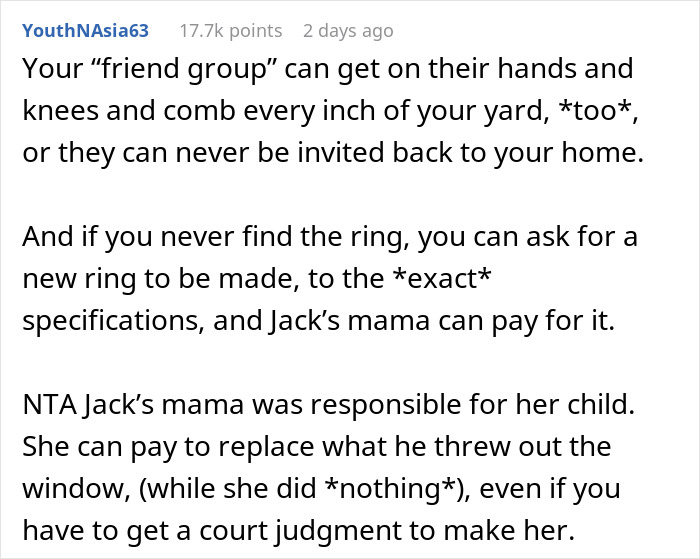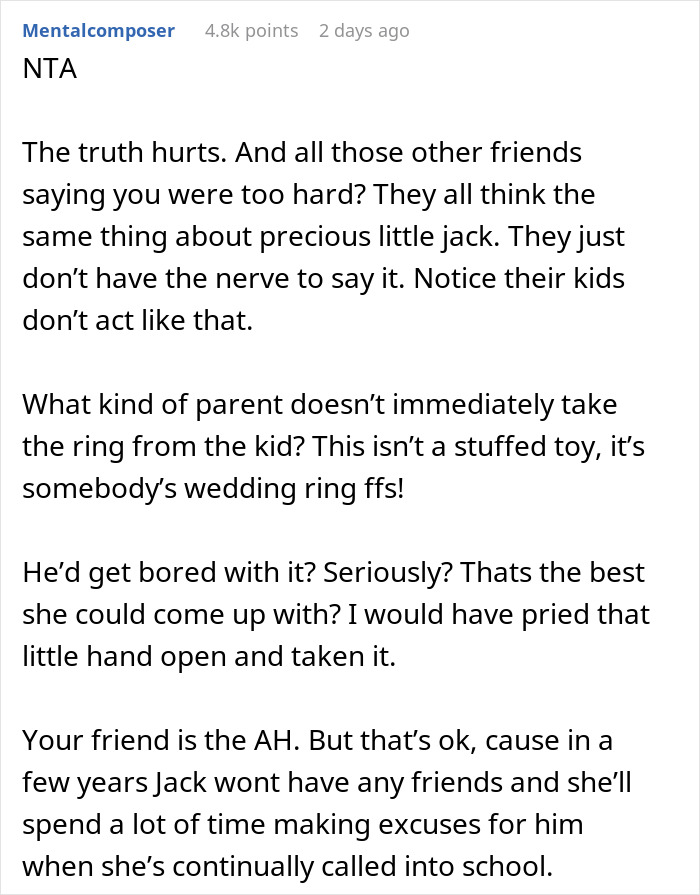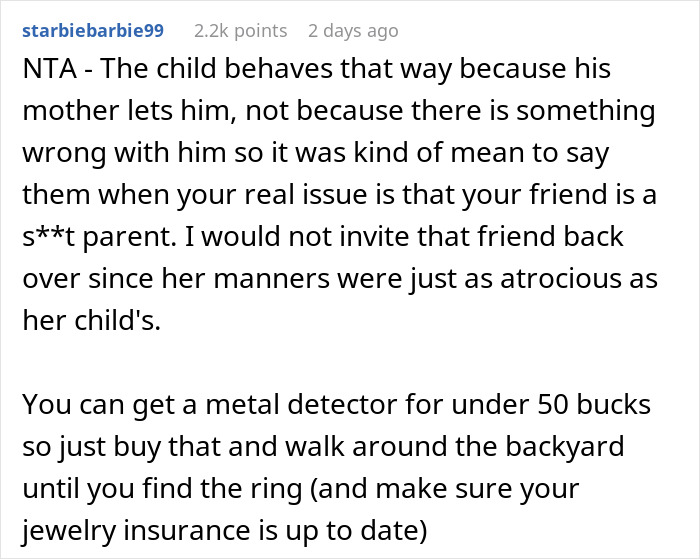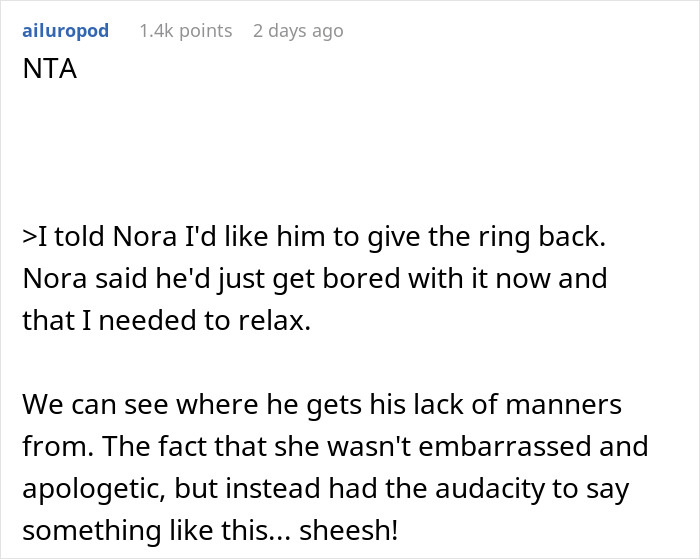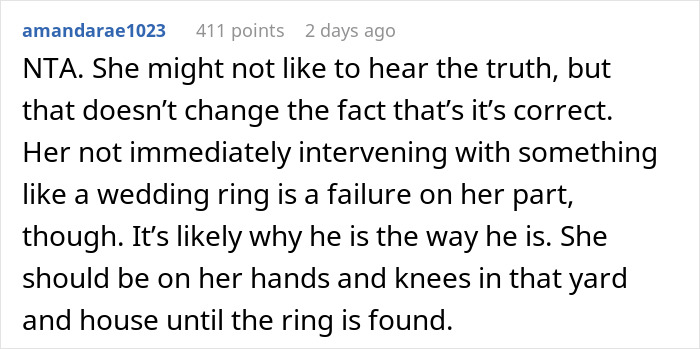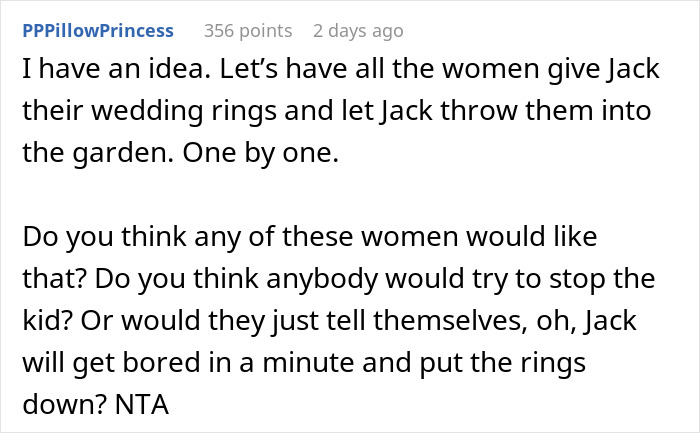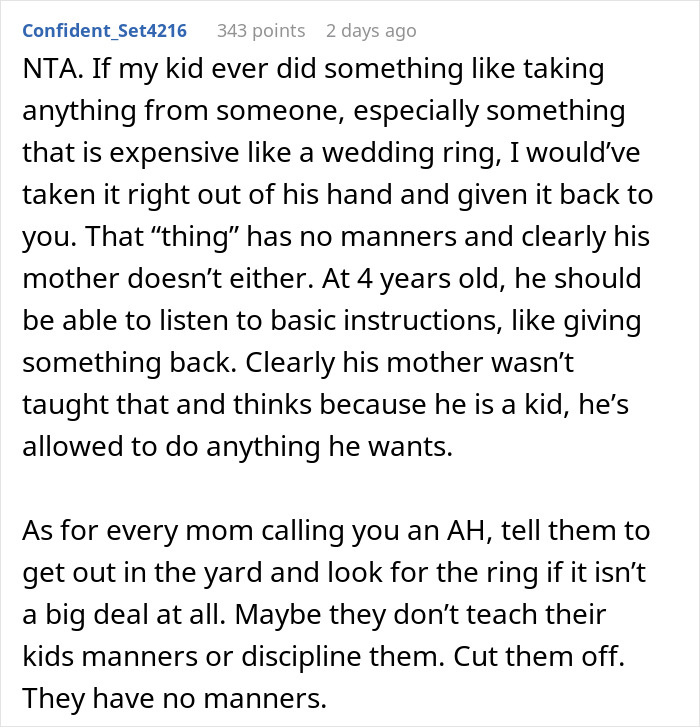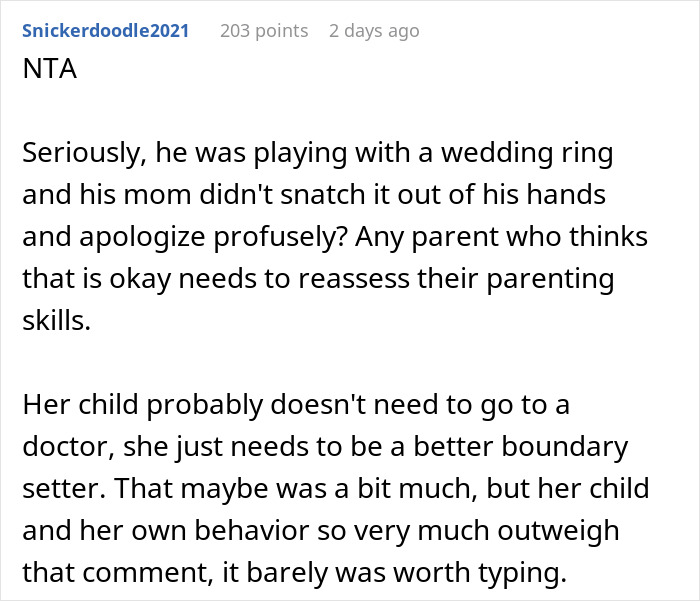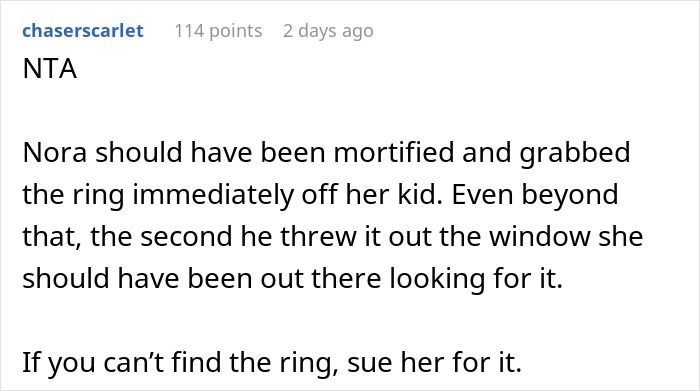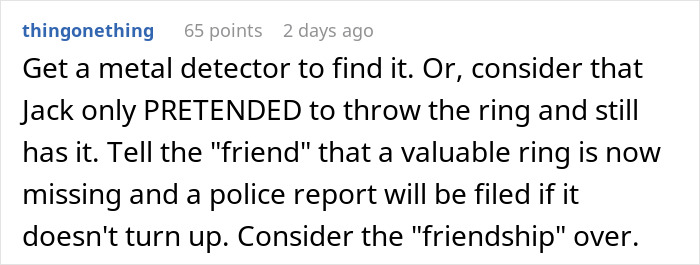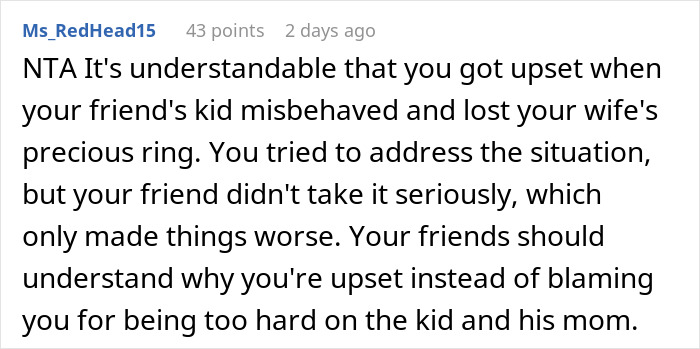That’s exactly what one anonymous woman, who was hosting lunch, did after a friend’s son threw a precious ring out the window. Bringing up the issue, however, didn’t go down well with the entire social group. Read on for the full story, as shared on the AITA online community. We reached out to Samantha Scroggin, the founder of the witty ‘Walking Outside in Slippers’ parenting blog, for her thoughts about whether or not to call someone out for their kid’s misbehavior. Scroll down to read the insights she shared with Bored Panda.
Children want to have fun, but they shouldn’t overstep certain boundaries. Especially when they’re not at home
Share icon Image credits: 🇸🇮 Janko Ferlič / unsplash (not the actual photo)
One woman, who had guests over, shared how everything went downhill after a friend’s kid got hold of a precious ring
Share icon Share icon Share icon Image credits: 🇸🇮 Janko Ferlič / unsplash (not the actual photo) Share icon Share icon Share icon Share icon Image credits: Liza Summer / pexels (not the actual photo) Share icon Image credits: Admirable-Cold-8875
“I’d hope that someone I’d choose as a friend would have the good sense to try to raise their child well”
Challenges involving different parenting styles and friends’ children are often very sensitive, and complicated, and usually don’t have clear-cut solutions. “I personally don’t have the self-control to not say something if I had a friend with a misbehaving child who harmed me or my property,” Samantha, the founder of ‘Walking Outside in Slippers,’ told Bored Panda in an email. “Granted, I’d fully expect the friend to address the issue before I could say anything,” she pointed out. “I’d probably give the friend a few seconds to jump in. But I don’t know that there is a right or wrong way to handle a situation like this, aside from of course not taking any physical action against the child or parent,” Samantha said. We asked the blogger whether it’s at all appropriate to comment on a friend’s parenting skills when their children misbehave in public. “I don’t think I’d find it appropriate to comment on a friend’s parenting, in front of their face at least! I’d hope that someone I’d choose as a friend would have the good sense to try to raise their child well,” she shared her perspective. “Of course, parenting issues come up for all of us and our kids act out at times. I think we can be understanding of accidents or isolated incidents, and also expect a child to not cause serious damage to people or things,” the founder of ‘Walking Outside in Slippers’ said.
Parents need to accept that it’s their responsibility to teach their children proper manners
There is a definite difference between being playful and misbehaving. While that line might (usually) be obvious to many adults, it might not be as clear to kids. Especially if their parents haven’t yet taught them about good manners, how to behave as guests or in public, and why they shouldn’t go around stealing people’s jewelry and then yeeting those sentimental heirlooms out the window. All of this might sound like common sense, but there’s no way of knowing these things unless they’re taught. That can happen through experience (e.g., learning the lesson the hard way when strangers call you out) or through the loving and careful instruction of a parent over a long time. If a child doesn’t know that they should respect other people’s property, the responsibility falls on their parents. Maybe their kid is still too young to fully understand these concepts. Maybe the kid forgot all they’ve learned and made a simple mistake like all kids do. Or maybe—just maybe—their parents haven’t been enforcing any boundaries on their (mis)behavior, so the kid doesn’t know that what they’re doing is wrong. They think that anything goes because they’ve never had to face the consequences of their actions. There is nothing wrong with having fun and playing at a guest’s home. But if you’re going around mischievously harming other people for your own amusement, something’s gone terribly wrong. Share icon Image credits: Monstera Production / pexels (not the actual photo)
If you’re going to broach these sorts of touchy issues at all, do everything as diplomatically as possible
Parenting is a super touchy topic as it is. So, if you’re going to call out your friends about how they’re sorely lacking in their parenting skills, it’s probably not going to go down well. How you phrase everything becomes key here because the message itself might make anyone, even some of your closest friends, react very strongly (even if you’re right). Try to be as diplomatic and understanding as possible, even if you’re furious inside. Where parenting issues are involved, one of the most powerful things in your arsenal is the ability to stay calm under pressure. In this particular case, it probably would have been best to explain to the friend exactly why the ring is so precious and meaningful to you and your partner. Then, ask them and their child to help you with the search. Publicly blowing up and telling the friend that they should take their kid to see a doctor is a misstep. Yes, your feelings are valid. Yes, it’s okay to be upset. Yes, you’ve been wronged. But if your goal is to find the ring and teach the friend a valuable lesson in good parenting, you can’t go around accusing them. They’ll only get defensive or upset.
These sorts of situations can be a wakeup call about how genuine your friendships really are
It takes a lot of self-awareness and humility to admit that you’ve failed as a parent. In front of your entire group of friends no less! It’s probably not going to happen. So, the better option would be to ask your friend for help finding the ring. Then, later, you might want to have a friendly but private chat with your friend about the concerns you have. Alternatively, you might want to (again, calmly) outright ask for compensation for the ring. Then, you can quietly decide to no longer invite your friends’ kids into your home for lunch ever again. Or you may want to reevaluate your entire social circle: if your pals don’t understand why you’re upset and they’re not offering any help, they might not be your real friends. As we’ve covered on Bored Panda earlier, true friendships are grounded in trust, empathy, and mutual respect. Without those things, someone’s probably a fake friend—they only ever want to be around you because they get something useful out of it, and even then, only when it’s convenient for them. Real friends stick by you through all of your ups and downs. They’ll understand why you’re upset about a ring getting thrown out the window. They’ll help you look for it. Fake friends will find excuses not to help and make themselves scarce. They’ll make empty promises or twist the situation around to make you look like you’re the villain.
Many readers wanted to share their thoughts while others had some spot-on advice for the woman
Anyone can write on Bored Panda. Start writing! Follow Bored Panda on Google News! Follow us on Flipboard.com/@boredpanda!










